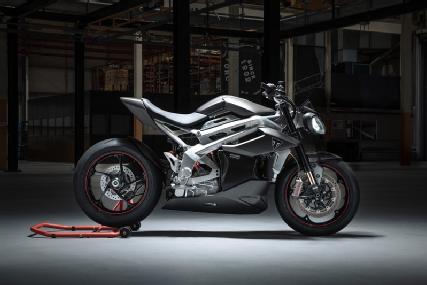WMG News - Latest news from WMG
Live testing to begin as part of landmark partnership to develop UK electric motorcycle capability
Today (Tuesday 8th February) marks the official end of the collaboration stage of the TE-1 project, a unique four-way partnership with WMG, Triumph Motorcycles, Williams Advanced Engineering and Integral Powertrain Ltd e-Drive Division, focusing on developing specialist electric motorcycle technology.
Engineering and Integral Powertrain Ltd e-Drive Division, focusing on developing specialist electric motorcycle technology.
The prototype demonstrator is now fully ready for the live testing programme led by Triumph Motorcycles.
The project, funded by the Office for Zero Emission Vehicles through Innovate UK, was set up to create ground-breaking developments in specialist electric motorcycle engineering and innovative integrated technology design.
Due to WMG’s vast experience and proven track record on key Innovate UK projects, Triumph Motorcycles asked WMG to project manage TE-1 on their behalf.
As part of this WMG was also tasked with identifying the project consortium partners, as well as providing guidance relating to future legislation, charging infrastructure and recycling strategies.
The prototype demonstrator integrates all the latest and final innovations from the project partner workstreams.
Triumph: final chassis, including frame, rear sub-frame, cockpit, panels and wheels, final drive system including transmission and Gates Carbon belt drive, electronics, Öhlins USD cartridge forks, unique prototype Öhlins RSU, Brembo M50 monobloc calipers, and Triumph motorcycle control software
Williams Advanced Engineering: final iteration of prototype WAE battery pack incorporating dedicated cell packaging for optimum centre of gravity, vehicle control unit, DCDC converter, integrated cooling, charge port, and styled carbon covers
Integral Powertrain: final prototype powertrain with scalable integrated inverter and combined motor with silicon carbide switching technology and integrated cooling
WMG: final pre-live trial simulation completed, with all results indicating that the project is on course to deliver the intended performance and durability outcomes
Truong Quang Dinh, WMG’s Associate Professor of Energy Management and Control Systems, explained: “Our creation of initial computer-based simulation models at the start of Phase 1 has been instrumental in ensuring that the component selection was appropriate to achieve the performance targets defined by the partners for the TE-1 Prototype.
“We have continued with this work across Phase 2 of the project, refining the models to a much more complex level to allow us and the partners to imitate further components on the bike such as braking, throttle, lighting and other systems and mimic real-world riding to provide development opportunities and real-time testing before components were fully designed. Additionally, we have created a physical rig wired with all of the control units and e-drivetrain, in order to implement a design validation test programme to ensure the function of each section was within the allowable range.”
Key project achievements so far include test results that exceed current benchmarks and targets set by the UK Automotive Council for 2025, providing a platform with great potential for future development in electric motorcycle performance.
Over the next six months the prototype demonstrator will undertake an extensive live testing programme within Triumph’s state-of-the-art facilities.
At the completion of the live testing phase, estimated to be Summer 2022, the prototype demonstrator will be updated with its final body panels and paint scheme, in preparation for active track demonstration. At this time, the full results of the project including the final specifications and testing outcomes will be published, as well as insights and key facts on how the TE-1 delivers on the project targets for innovation and sets new standards for the motorcycle sector overall, including final battery and range performance.
“It has been truly exciting to see the progress made during phase 3 of Project Triumph TE‑1 with the final prototype motorcycle now going into real life testing. Everyone involved at Triumph are proud to have been part of this innovative British collaboration. Personally, I am thrilled with the results we have already achieved with our partners, and the exciting preview of the potential electric future to come.” said Nick Bloor, Triumph CEO. “We look forward to continuing the ambitious and innovative work on the TE-1 demonstrator prototype through the live testing phase and sharing the outcome with Triumph fans across the world.”
Read more about WMG’s Transport Electrification research expertise here: Energy (warwick.ac.uk)
